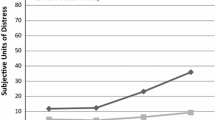Abstract
Sensitive Interaction Systems Theory suggests that complex problems, including adverse medical diagnoses, can create tension in the social support process. In this experiment one member of a romantic couple received medical feedback that either threatened gender roles or was irrelevant. The couple's interaction was covertly recorded for the support activation behaviors displayed by the support seeker and for the interactive coping behaviors offered by the help giver. Both type of support activation and type of problem affected the use of support behavior.Nonverbal support activation behaviors promoted helpers' use ofavoidance interactive coping behaviors, whereasverbal activation behaviors promotedapproach interactive coping behaviors, suggesting a tit-for-tat dynamic. The gender-role relevance of the medical diagnosis also influenced helpers' use of approach behaviors, although not the support seekers' need for support or efforts to elicit support.
Similar content being viewed by others

References
Barbee, A. P. (1990). Interactive coping: The cheering up process in close relationships. In S. W. Duck (Ed.),Personal relationships and social support (pp. 46–65). London: Sage.
Barbee, A. P.(1991, October). The role of emotions and cognitions in the interactive coping process. In R. Baumiester (Chair),Interpersonal Causes of Emotions. Symposium conducted at the meeting of the Society of Experimental Social Psychology, Columbus, Ohio.
Barbee, A. P., & Cunningham, M. R. (1995). An experimental approach to social support communications: Interactive coping in close relationships.Communication Yearbook, 18, 381–413.
Barbee, A. P., Cunningham, M. R., Winstead, B. A., Derlega, V. J., Gulley, M. R., Yankeelov, P. A., & Druen, P. B. (1993). Effects of gender role expectations on the social support process.Journal of Social Issues, 49(3), 175–190.
Baron, R. S., Cutrona, C. E., Hicklin, D., Russell, D. W., Lubaroff, D. M. (1990). Social support and immune function among spouses of cancer patients.Journal of Personality and Social Psychology, 59, 344–352.
Belle, D. (1987). Gender differences in the social moderators of stress. In R. C. Barnett, L. Biener, & G. K. Baruch (Eds.),Gender and stress (pp. 257–277). New York: Free Press.
Buss, D. M. (1988). The evolution of human intrasexual competition: Tactics of mate attraction.Journal of Personality and Social Psychology, 54, 616–628.
Collins, N. L., Dunkel-Schetter, C., Lobel, M. & Scrimshaw, S. C. M. (1993). Social support in pregnancy: Psychosocial correlates of birth outcomes and postpartum depression.Journal of Personality and Social Psychology, 65, 1253–1258.
Goldsmith, D. J. (1994). The role of facework in supportive communication. In B. R. Burleson, T. L. Albrecht, & I. G. Sarason (Eds.),Communication of social support (pp. 29–49). London: Sage.
Grossman, M., & Wood, W. (1993) Sex differences in the intensity of emotional experience: A social role interpretation.Journal of Personality and Social Psychology, 65, 1010–1022.
Gulley, M. R. (1993).Sequential analyses of social support elicitation and provision behaviors. Unpublished doctoral dissertation, University of Louisville.
Gulley, M. R., Barbee, A. P., & Cunningham, M. R. (1991, May).Support seeking and giving among same-sex friends, opposite sex friends and romantic partners. Paper presented at the meeting of the International Conference on Personal Relationships, Normal, Illinois.
Kelley, H. H., & Thibaut, J. W. (1978).Interpersonal relations: A theory of interdependence. New York: Wiley.
Maynard, D. (1991). Bearing bad news in clinical settings. In B. Dervin (Ed.),Progress in communication sciences (pp. 55–72). Norwood: Ablex.
Rook, K. (1984). The negative side of social interaction: Impact on psychological well-being.Journal of Personality and Social Psychology, 46, 1097–1108.
Rook, K. S. (1990). Stressful aspects of older adults' social relationships: Current theory and research. In M. A. P. Stephens, J. H. Crowther, S. E. Hobfoll, & D. L. Tennenbaum (Eds.),Stress and coping in later-life families (pp. 173–192). New York: Hemisphere.
Simpson, J. A., Rholes, J. A., & Nelligan, J. S. (1992). Support seeking and support giving within couples in an anxiety-provoking situation: The role of attachment styles.Journal of Personality and Social Psychology, 62, 434–446.
Spitzberg, B., & Cupach, W. (1984).Interpersonal communication competence. Beverly Hills, CA: Sage.
Yankeelov, P. A., Barbee, A. P., Cunningham, M. R., & Druen, P. (1991, May).Interactive coping in romantic relationships. Paper presented at the meeting of the International Conference on Personal Relationships, Normal, Illinois.
Winstead, B. A., & Derlega, V. J. (1991). An experimental approach to studying social interaction and coping with stress among friends. In W. H. Jones and D. Perlman (Eds.),Advance in Personal Relationships (Vol. 2, pp. 107–131). London: Jessica Kingsley.
Author information
Authors and Affiliations
Additional information
The present paper is based on a Masters Thesis in Psychology completed by the first author under the direction of the second author and was presented at the Iowa Conference on Personal Relationships, May, 1993.
The authors thank Timothy Carrico, David Clippinger, and Cresant Smith for their help with the experiment. The authors are also very grateful to Melissa Berry for her special assistance in conducting this research. Thanks are also expressed to the reviewers of the manuscript, Carolyn Cutrona and Barbara Winstead.
Rights and permissions
About this article
Cite this article
Yankeelov, P.A., Barbee, A.P., Cunningham, M.R. et al. The influence of negative medical diagnoses and verbal and nonverbal support activation strategies on the interactive coping process. J Nonverbal Behav 19, 243–260 (1995). https://doi.org/10.1007/BF02173083
Issue Date:
DOI: https://doi.org/10.1007/BF02173083


